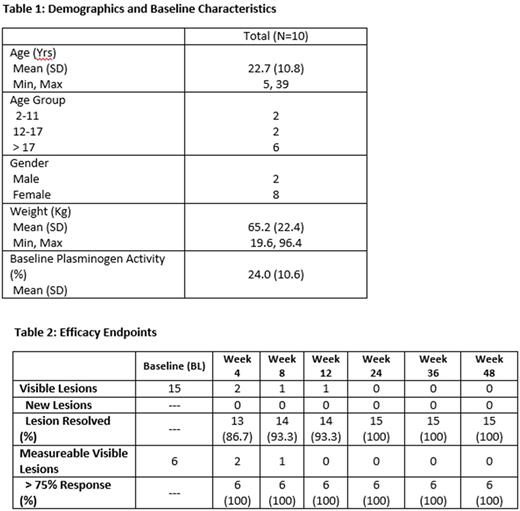Abstract
Background: Congenital plasminogen deficiency (PLGD) caused by mutations in the PLG gene is a rare genetic disorder that leads to clinical manifestations due to extravascular fibrinous deposits on mucous membranes with disruption of tissue or organ function (Tefs 2006; Mehta 2008). Prometic has developed an intravenous (IV) plasminogen (PLG) product (Prometic's-PLG) derived from human plasma as replacement therapy for treatment and prevention of extravascular fibrinous (ligneous) lesions in children and adults with PLGD.
Aims: To determine whether Prometic's-PLG is safe and effective in pediatric and adult subjects with PLGD over 48 weeks of replacement therapy.
Methods: Fifteen pediatric and adult subjects aged 2 to 80 years with PLGD were enrolled in an open-label study to receive multiple IV doses of 6.6 mg/kg Prometic's-PLG for at least 48 weeks. An analysis was performed after 10 subjects completed 48 weeks of treatment. Subjects were dosed every 2, 3, or 4 days based upon a pharmacokinetic (PK) profile to maintain target trough PLG activity levels > 10% (absolute) above baseline values. Extravascular ligneous lesions (visible and non-visible) were assessed at baseline, weeks 4, 8, 12, and every subsequent 12 weeks up to 48 weeks. Safety, tolerability and quality of life were also assessed.
Results: Subject baseline characteristics are included in Table 1. Six of 10 subjects had 15 visible lesions at baseline. After 12 weeks, 14 of 15 lesions (93.3%) completely resolved; the remaining lesion shrank to an unmeasurable size. After 48 weeks, all 15 lesions had completely resolved. There were no new lesions or recurrences of previous lesions (Table 2). There were no deaths, serious adverse events (AEs), or AEs resulting in study drug discontinuation. The most frequent AE was nasopharyngitis.
Conclusions: Repeated IV doses of 6.6 mg/kg Prometic's-PLG demonstrated excellent efficacy in the resolution of lesions due to PLGD with no recurrences or new lesions while on replacement therapy for 48 weeks, with no safety concerns. Prometic's-PLG represents a pivotal breakthrough in the treatment of this very rare coagulation deficiency and an important therapeutic advance for affected patients who have suffered under the burden of their disease due to lack of an available efficacious therapy.
References:
1. Tefs K et al. Blood, 2006 Nov; 108(9):3021-6
2. Mehta R, Shapiro AD. Hemophilia, 2008 Nov; 14(6):1261-8
Parker: Prometic Biotherapeutics: Employment, Equity Ownership. Albert: Prometic Biotherapeutics: Employment, Equity Ownership. Laurin: Prometic Life Sciences: Employment, Equity Ownership, Membership on an entity's Board of Directors or advisory committees, Patents & Royalties. Moran: Prometic Life Sciences: Employment, Equity Ownership, Membership on an entity's Board of Directors or advisory committees. Sandset: Prometic Life Sciences: Other: Clinical research protocols. Shapiro: SHIRE: Membership on an entity's Board of Directors or advisory committees, Other: Clinical research protocols; Bioverativ: Membership on an entity's Board of Directors or advisory committees, Other: Clinical research protocols; Genentech: Membership on an entity's Board of Directors or advisory committees; NovoNordisk: Membership on an entity's Board of Directors or advisory committees, Other: Boardmember NovoNordisk Hemophilia Foundation; Kedrion Biopharma: Consultancy, Other: Clinical research protocols; Prometic Life Sciences: Consultancy, Other: Clinical research protocols; Bayer Healthcare: Other: Clinical research protocols; Daiichi Sankyo: Other: Clinical research protocols; Octapharma: Other: Clinical research protocols; OPKO: Other: Clinical research protocols; PTC Therapeutics: Other: Clinical research protocols.
Author notes
Asterisk with author names denotes non-ASH members.


This feature is available to Subscribers Only
Sign In or Create an Account Close Modal